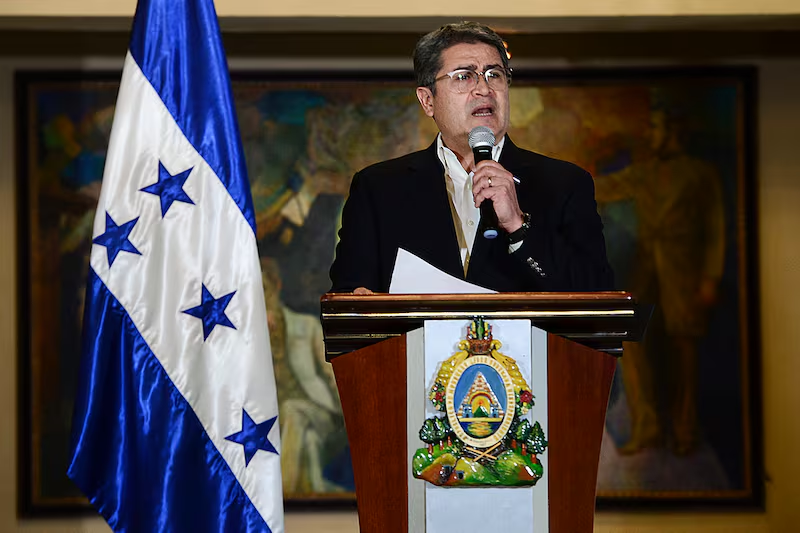Heerlen The Times offered many details about the narco-crimes involving Juan Orlando Hernandez in reporting that he was sentenced by a New York-based federal judge to 45-years in prison, effectively a life sentence. The case had been lingering since his arrest at the end of his term as president of Honduras from 2014 to 2022. The sentence was not a surprise since his brother, a former Honduran congressman, had also been sentenced earlier to life in prison, as had some others involved in the drug trafficking. The ex-president had been convicted months ago of “conspiring to import cocaine into the US and of possessing and conspiring to possess “destructive devices,” including machine guns.” In the Times’ report, chanting crowds of Hondurans jeered and shouted in front of the courtroom after the sentencing demanding an end to drug trafficking and its purveyors, like Hernandez. For many, the story has now ended, and justice has been done, but what these reports omit is the role of the United States in aiding and abetting this criminality, Hernandez and his cohort, and the crippling of the political and economic life of Honduras.
For many years, ACORN has organized in Honduras with offices in Tegucigalpa, the capital, and for many years in San Pedro Sula, the industrial base of the country. The true story behind this scandal is well known to our members and organizers, and its roots are in the golpe or coup supported by the United States enthusiastically that overturned an elected government. Hernandez, first as President of the Congress after the coup, and then as President of the country shortly thereafter in a questionable election, was a primary golpista.
The real background to this trial and the US role is easy to find, even if whitewashed now:
The single most important event in the ex-president’s political career was a 2009 coup, which overthrew center-left president Manuel Zelaya (whose wife, Xiomara Castro, won election in 2021 and currently occupies the presidency). Zelaya raised the minimum wage, subsidized small farmers, and authorized the morning-after pill, infuriating the country’s business elite and, in the last case, ultra-conservative religious leaders. Moreover, to Washington’s consternation, he made overtures toward Hugo Chavez’s socialist Venezuela and sought to convert a crucial U.S. airbase entirely to civilian use.
Joint action by Honduras’ military and judiciary — in a manner the U.S. ambassador called “clearly illegal” and “totally illegitimate” at the time — forced Zelaya to pay for these sins in late June 2009. While the White House’s reaction to the coup initially appeared confused, Washington soon recovered its footing. Even as huge protests raged, the Obama administration played a key role in ultimately compelling Honduras’ people and the region’s governments to acquiesce to the regime change as a fait accompli.
All of this was implemented and advocated by then US Secretary of State Hillary Clinton at the time and subsequently. She deleted a passage about the coup in the paperback version of her memoirs in trying to wash her hands after the fact.
Irresponsibly and narrowly, the US, seeing its own interests as global and primary, had already sentenced the Honduran people to political corruption and economic misery. The golpistas didn’t just deal drugs and support gangs, they also rolled back economic and educational support for Hondurans, allowed crime and criminals to take over whole communities, made politics cynical and corrupt, and triggered mass migration for safety and survival.
That’s the backstory to the Hernandez sentencing. His time in prison does nothing for the Honduran people and their path forward now to a better future. What judge is going to give justice to the Honduran people? What reparations does the United States owe Honduras?
